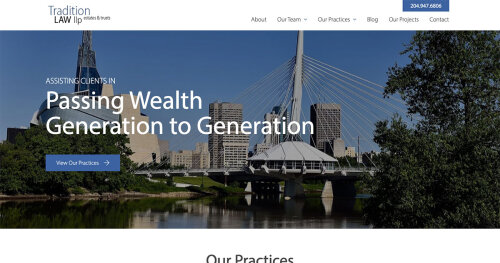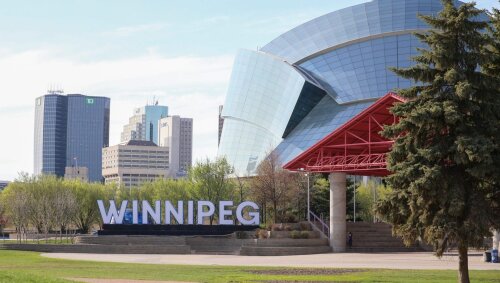Best Water Law Lawyers in Winnipeg
Share your needs with us, get contacted by law firms.
Free. Takes 2 min.
List of the best lawyers in Winnipeg, Canada
About Water Law in Winnipeg, Canada
Water Law in Winnipeg, Canada, is a specialized area of law that governs the use, management, control, and protection of water resources. This includes surface water such as lakes and rivers, as well as groundwater. Winnipeg's Water Law is shaped by municipal, provincial, and federal regulations, as water is a shared responsibility in Canada. Issues commonly addressed by water law include water rights, water quality, drainage, flood protection, and the impact of development on water resources. In Winnipeg, managing the quantity and quality of water is particularly important due to reliance on the Shoal Lake Aqueduct for drinking water, and the city's location at the convergence of several major rivers.
Why You May Need a Lawyer
Legal advice in Water Law can be essential in many scenarios. Whether you are a homeowner facing flood damage, a developer concerned about drainage and permitting, a farmer disputing water rights, or an organization challenging a municipal water decision, legal assistance can help determine your rights and responsibilities. Other common situations include environmental disputes, compliance with regulations, water contamination concerns, and negotiating water-related contracts or agreements. Since the rules can be complex and involve multiple levels of government, obtaining legal advice can help protect your interests and ensure compliance.
Local Laws Overview
Winnipeg’s Water Law framework draws from several sources:
- The City of Winnipeg Charter: Governs municipal authority over water services, supply, and waste management.
- Manitoba Water Rights Act: Regulates the allocation and use of water, requiring licences for most uses except domestic household consumption.
- Environment Act (Manitoba): Sets standards for water quality, pollution prevention, and environmental assessments for projects impacting water.
- Floodway Authority and Flood Protection Bylaws: Manage flood risks and impose restrictions on land development near flood-prone areas.
- Federal Fisheries Act and Navigable Waters Act: Apply to any water uses that may affect fish habitat or navigation.
Landowners in Winnipeg must often comply with local floodplain regulations, secure permits for altering drainage, and may be subject to inspections or penalties if municipal or provincial laws are breached. Water law also addresses cross-border issues, such as the impact of upstream activities on downstream properties.
Frequently Asked Questions
What is considered public versus private water in Winnipeg?
Most larger bodies of water, including rivers and lakes, are public resources regulated by provincial and local authorities. Private water sources typically refer to wells or surface water located entirely on private property and used for domestic purposes.
Do I need a permit to use river or lake water on my property?
Yes, by law, any use of surface water for irrigation, industrial, or commercial purposes generally requires a water rights licence from the Manitoba government. Domestic household use is usually exempt.
What should I do if my property floods due to municipal drainage issues?
Contact your local municipal office to report the problem. If damages are extensive or due to negligence, consult a lawyer about potential claims for compensation or legal remedies.
Can I alter or divert watercourses on my land?
Any alterations or diversions, even on private land, require approval from the responsible provincial or municipal authorities. Unauthorized work can result in fines and orders to restore the original condition.
How can I address water contamination affecting my property?
Report contamination to the City of Winnipeg and to Manitoba Conservation and Climate. You may wish to consult a lawyer to explore your rights, remedies, and responsibilities if you or a neighbor are affected.
Who oversees Winnipeg’s drinking water supply?
The City of Winnipeg is responsible for treating and distributing drinking water, sourced primarily from Shoal Lake. Water quality is regulated by both municipal and provincial bodies.
What legal recourse do I have if upstream activities impact my water flow?
You may have legal options under nuisance, negligence, or trespass laws. Consult a lawyer to determine if you can claim damages or seek an injunction based on the harm caused.
Are there special rules for developing near rivers or flood zones?
Yes, strict Winnipeg bylaws and provincial rules restrict construction in flood-prone areas. You may need special permits, and building codes may set mandatory flood-proofing measures.
Do rural or agricultural properties follow different water regulations?
While many rules apply citywide, rural and agricultural uses often require different licensing from the province, especially for irrigation or large-scale water withdrawals.
Can city bylaws override provincial or federal water regulations?
No. Municipal bylaws cannot conflict with provincial or federal laws. In case of conflict, higher-level laws take precedence.
Additional Resources
- Manitoba Water Stewardship Division - Information on licensing, regulations, and water management
- City of Winnipeg Water and Waste Department - Resources for municipal water bylaws, flooding, and permits
- Manitoba Conservation and Climate - Environmental standards and water protection programs
- Legal Aid Manitoba - Assistance for those requiring affordable legal help
- Law Society of Manitoba - Directory of lawyers specializing in environmental or water law
- Canadian Environmental Law Association - Public legal education and advocacy on water issues
Next Steps
If you need legal assistance in Water Law, start by gathering all relevant documents, correspondence, and photos related to your issue. Clearly outline your concerns and what outcome you hope to achieve. Contact a qualified Water Law lawyer or local legal aid service for a consultation. Be prepared to discuss timelines, potential costs, and the steps involved in resolving your matter. Staying informed and proactive is key, as water disputes often involve strict regulatory deadlines and complex legal frameworks.
Lawzana helps you find the best lawyers and law firms in Winnipeg through a curated and pre-screened list of qualified legal professionals. Our platform offers rankings and detailed profiles of attorneys and law firms, allowing you to compare based on practice areas, including Water Law, experience, and client feedback.
Each profile includes a description of the firm's areas of practice, client reviews, team members and partners, year of establishment, spoken languages, office locations, contact information, social media presence, and any published articles or resources. Most firms on our platform speak English and are experienced in both local and international legal matters.
Get a quote from top-rated law firms in Winnipeg, Canada — quickly, securely, and without unnecessary hassle.
Disclaimer:
The information provided on this page is for general informational purposes only and does not constitute legal advice. While we strive to ensure the accuracy and relevance of the content, legal information may change over time, and interpretations of the law can vary. You should always consult with a qualified legal professional for advice specific to your situation.
We disclaim all liability for actions taken or not taken based on the content of this page. If you believe any information is incorrect or outdated, please contact us, and we will review and update it where appropriate.










